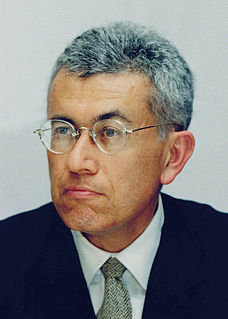A Quote by Peter Diamandis
The thing about frontiers, it allows the individuals who are best, whether they're men or women or minorities or whatever, to step to the top. So in traditional societies, old world societies, in the United Kingdom if you would; if you were born into the right stratus, the right class, you had the ability to succeed.
Related Quotes
We view Sufism not as an ideology that molds people to the right way of belief or action, but as an art or science that can exert a beneficial influence on individuals and societies, in accordance with the needs of those individuals and societies ... Sufi study and development gives one capacities one did not have before.
History is driven, over the long haul, by culture - by what men and women honor, cherish, and worship; by what societies deem to be true and good, and by the expressions they give to those convictions in language, literature, and the arts; by what individuals and societies are willing to stake their lives on.
In a cross-cultural study of 173 societies (by Herbert Barry and L. M. Paxson of the University of Pittsburgh) 76 societies typically had mother and infant sharing a bed; in 42 societies they shared a room but not a bed; and in the remaining 55 societies they shared a room with a bed unspecified. There were no societies in which infants routinely slept in a separate room.
We see that there are two different kinds of...societies: (a) parasitic societies and (b) producing societies. The former are those which live from hunting, fishing, or merely gleaning. By their economic activities they do not increase, but rather decrease, the amount of wealth in the world. The second kind of societies, producing societies, live by agricultural and pastoral activities. By these activities they seek to increase the amount of wealth in the world.
In a world of democracies, in a world where the great projects that have set humanity on fire are the projects of the emancipation of individuals from entrenched social division and hierarchy; in such a world individuals must never be puppets or prisoners of the societies or cultures into which they have been born.
Ballet is the repetitive training of the body for the purpose of executing steps in traditional fashion. It is tied to and bound by the past. It is a disciplined beauty consciously preserved in the image of the old days in societies that were class-conscious and appreciative of elitist physical expertise.
Probably the institution of marriage had its origin in love of property. Both men and women were united in this--that whatever they loved best, they wished to possess. The usual theory holds that the communal system would not permit the gratification of this desire at the expense of communal rights, and that therefore men were driven to gratify their passion by purchasing or by capturing women from neighboring and hostile tribes.
Look at the history of the printing press, when this was invented what sort of consequences this had. Or industrialization, what sort of consequences that had. Very often, it led to enormous transformational processes within individual societies. And it took awhile until societies learned how to find the right kind of policies to contain this and manage and steer this.
I suppose the most important thing, the heaviest single factor in one's life, is whether one's born male or female. In most societies it determines one's expectations, activities, outlook, ethics, manners - almost everything. Vocabulary. Semiotic usages. Clothing. Even food. Women... women tend to eat less... It's extremely hard to separate the innate differences from the learned ones. Even where women participate equally with men in the society, they still after all do all the childbearing, and so most of the child-rearing.
When it comes to public policy, doing the right thing is more important than doing it for the right reason. The best way to get people to do what's right collectively is to make it the best thing for them to do individually. You have to give individuals a personal incentive to do what's right for society.



































